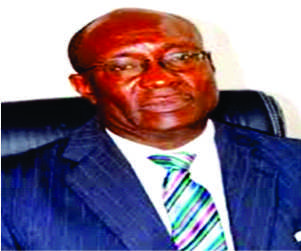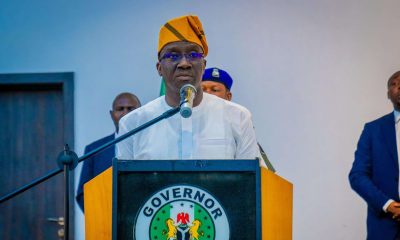Business
We need to focus on market development, liquidity — ASHON Boss
Published
10 years agoon
By
Publisher
The recent recapitalisation exercise of Capital Market Operators (CMOs) has left stakeholders pondering over strategies towards achieving a new and more formidable capital market. In this interview with, CHIOMA OBINAGWAM, the President of Association of Stockbroking Houses of Nigeria (ASHON), Emeka Madubuike talks on the imperatives of capital market development, liquidity, among sundry issues. Excerpts:
NOW that the re-capitalisation exercise for Capital Market Operators (CMOs) has come to an end. What are we likely to see in market operators strategies?
Right now what I think everybody should be doing is that of developing the market; whether that would involve immediate expansion out of Lagos is another thing entirely. The truth of the matter is that we need to get in more participants in the market and also the processes in the market. We are working with the Nigerian Stock Exchange (NSE) to ensure that processes, procedures and technologies are upgraded in such a way that our market will be globally competitive.
So right now, I think what needs to happen is to look at market development. Every stakeholder must focus on market development such that the market is deep enough and profitable enough to sustain all the stakeholders in the market.
What is the benefit of the recapitalisation exercise to CMOs?
The effect of the recapitalisation exercise is that for some CMOs that had to bring in more capital, they need to sweat that capital to make money with it. That is why my earlier comment is very critical, that the focus after this capitalisation and after increasing standards should be that of market development. How do we grow the market to ensure that this additional capital that operators have had to get and inject should be sweated and yield more profits. This is because if you have investors that have invested in these businesses those investors need to make returns; that is why after this capitalisation and minimum operating standards, the focus should be on market development.
The Securities and Exchange Commission (SEC) has suspended some market operators and also lifted some of these suspensions. What is your relationship between the regulators and operators in terms of suspension of market operators?
Our market is a rule-based market. When some people who are operating in the market have breached one rule or the other, the SEC has its own way of tracking those breaches and enforcing those rules. Some of those enforcement could mean that the operators are suspended. What we do from the point of view of the association is the fact that we try and look at the issues involved and we try and engage the SEC and of course if the operators are our members, we try and get them to do what they need to do for the suspension to be lifted.
So, there is a continuous engagement between us as an association and SEC as a regulator because the overall objective is to ensure that the market is healthy, transparent, and accountable.
What is your association doing in driving domestic investor participation in the market?
That is part of what I meant when I talked about market development. We need to increase the local-retail participation base. Not just the retail investors, even corporates and the government.
So, our market development initiative drive going forward will cover all the stakeholders from government to corporates and individuals. It is important to understand that the capital market is part of the economy. If the economy is not doing well, the market is not likely to do well. It does not stand in isolation. If we have an economy that has depended on crude oil for 90 per cent of its revenue and that single product the prices are down of course it will affect the capital market.
Moreover, from the point of view of shareholders, if the businesses they have invested in are not doing well, they are not likely to get dividends; that is why it has to be a collective effort.
However, from the point of view of us operators and regulators, we believe that we need to begin to look at market development, liquidity and having an economy that is capital market focused so that more products are introduced into the market and more Nigerians will be given the opportunity to invest in the new market that we are envisaging. I think that is what we really need to do.
Do you have any template of how you hope to achieve this initiative?
There is a 10-year Master plan, which in my view it has to start with literacy- getting people to understand what the market is about. So, the kick-off is literacy and to achieve it, we have to use all the media. There are going to be town hall meetings, fliers, jingles and all of that. You cannot do too much of it. It has to be a continuous exercise to ensure that people understand the risks and the returns in the market, so that when they are making investment decisions, they are well informed. That is one single way of raising the investor base- literacy which involves giving the right information.
People must understand that the capital market is not just a place where you just put money and go and expect that two months down the line the money would have doubled or tripled. We need to have an informed investor base.
How far have you gone in encouraging the government of Nigeria in using the capital market as a source of raising funds for infrastructural projects etc?
You see, when I talk about literacy, it doesn’t just have to do with individuals. It has to go across board. The message we are beginning to pass is that no economy can develop without a viable capital market.
For too long, the government has depended on the money market. Whether they are local money market or international money market and so we think that this new government must change, especially because it is a government of change. It must begin to look at the capital market as the platform for which to raise project development, especially because the capital market is where you can raise long-term money to fund long-term projects.
What is your relationship with the Economic and Financial Crimes Commission (EFFCC) regarding certain share price manipulation?
We have touch base with the chairman of EFCC. What happens is the fact that the NSE has an MOU with EFCC. You know, when there are infractions in the market, those infractions are dealt with in two ways. There is the administrative part that has to do with processes and procedures and those ones are handled through a complaints management framework that has been put together by the market and has been endorsed by the SEC.
However, any criminal aspect of any infraction goes to the EFCC that is the relationship. When it goes beyond the administrative, it becomes a criminal issue and the market does not have the powers to go into criminal prosecution. You know, what has happened in the past is that at the EFCC, there is a capital market desk. So, they have people who have worked with the SEC who have some knowledge about how the capital market operates.
Again, that is part of what our enlightenment and literacy programme is about. We must get people who are in law enforcement who understand the capital market. So that when those things get there, they are not treated like any other police matter. Their people must be trained to understand how the capital market operates.
After the meltdown, some stockbroking firms have found it difficult to do business in the capital. Some of them complained about the brokerage fees whereas others complained about domestic investors exit. What factors do you think has contributed to firm’s exit from the capital market?
It is the economy. You know, like I said to you. The capital market is not in isolation. If the economy is not doing well, the capital market cannot do well.
It is a question of being able to manage whatever challenges that come. Every sector of the economy has its own challenges. That is why it is important for people to strategise and see ways of improving the market. What we have been doing in the last five years, we are not likely to go that way. We must begin to look for new ways that is why the stock exchange is looking at improving on technology as a way of ensuring that you increase the market share. Given what is happening with technology all over the world today, a lot of people. Young people, like you have all kinds of smart phones. We are looking at the issue of smart trading. Is there any way people can be trading directly through their smart devices, those are new ways of encouraging people to participate in the market.
How would you compare the performance of stocks on the NSE with that of other emerging markets?
The fact is that we need to do a lot more. This is because we have a situation where our economy is the largest and our capital market, is like it is the smallest. That is why we need to grow our capital market. All over the world, the capital market is used as a benchmark for measurement.
Trending

 Health1 week ago
Health1 week agoDeclassified CIA memo explored concealing mind-control drugs in vaccines

 Latest1 week ago
Latest1 week agoFubara pledges collaboration with APC lawmakers after Rivers by-elections

 Health7 days ago
Health7 days agoGroups launch ‘COVID Justice’ campaign, urge U.S. Senate to adopt accountability resolution

 Football7 days ago
Football7 days agoJuventus prepare €120m bid for Osimhen as summer rebuild plans gather pace

 News1 week ago
News1 week agoFamily demands coroner’s inquest into death of Chimamanda Adichie’s son

 Latest1 week ago
Latest1 week ago2027 race: ADC battles setbacks, arrests, internal strains as opposition fortunes waver

 Latest1 week ago
Latest1 week agoOkpebholo condemns attack on ADC members, vows to keep Edo peaceful

 News1 week ago
News1 week agoMother, son escape death as Lexus SUV overturns three times in Lagos

